With the announcement of the New Southbound Policy more than two years ago, the government signaled its dedication to helping Taiwanese businesses expand beyond the Greater China market. Whether they were already moving south or aspired to do so, companies have begun to see the results of this promise.
The figures alone evidence the policy’s success: From January to August, trade with the 18 targeted nations rose 5.5 percent from a year earlier, according to the Executive Yuan’s Office of Trade Negotiations.
However, the successes go beyond the bottom line — a key facet of the policy is its focus on long-term development and efforts to “forge a sense of economic community,” and government agencies have responded with an array of resources to achieve these goals.
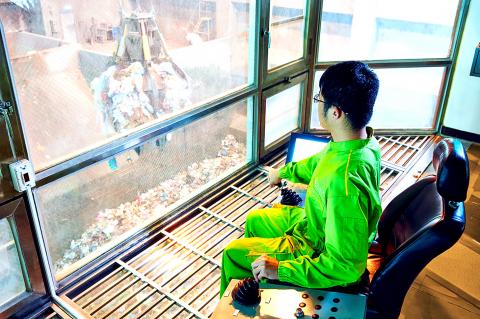
Photo courtesy of ECOVE Environment Corp
As a sector that combines people-to-people exchanges with economic cooperation — two of the policy’s main strategies — the service industry has a central role to play in its success, but it faces an array of challenges.
Most Taiwanese businesses are small to medium-sized enterprises that face stiff competition in markets dominated by large companies that control business channels and have well-developed branding, said Lien Yung-chih (連勇智), a former director-general of the Commerce Development Research Institute’s Marketing and Consumer Behavior Research Division, in an interview with International Community Radio Taipei (ICRT).
To address these challenges, organizations and agencies are offering branding and networking services to companies looking to operate abroad.
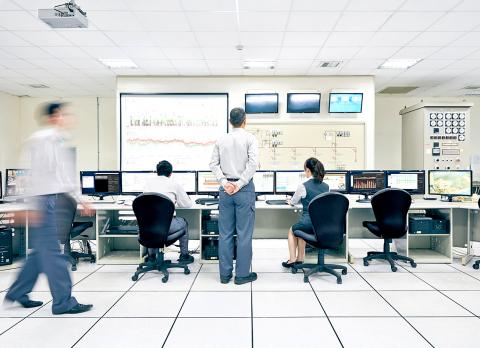
Photo courtesy of ECOVE Environment Corp
One such program, the second-phase “Branding Taiwan” campaign by the Ministry of Economic Affairs’ Industrial Development Bureau, collaborates with the institute and other groups to help outward-looking companies develop brands that could better appeal to global audiences.
Since 2016, it has prioritized companies that are looking southward or are in a “five plus two” sector, according to its calls for submissions.
The “five plus two” industries refer to the development of an “Asian Silicon Valley,” smart machinery, green energy technology, biomedicine and national defense, as well as new agricultural business models and a circular economy.
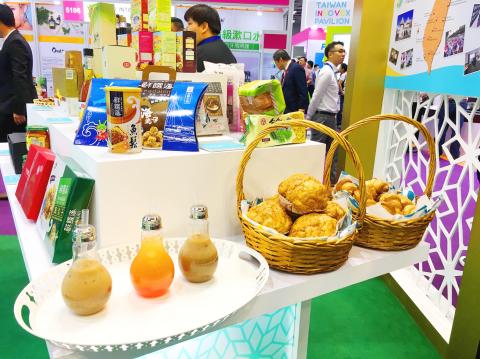
Photo: Huang Pei-chun, Taipei Times
Few companies fit these criteria better than ECOVE Environment Corp (崑鼎), which used to be known as KD Holding Corp.
A subsidiary of global engineering services provider CTCI (中鼎集團), the environmental services provider has since 1999 become one of Taiwan’s leaders in developing a circular economy, focusing on energy from waste (EfW), waste management, resource recovery and solar power.
ECOVE operates seven EfW and two industrial and special waste treatment plants in Taiwan, and two EfW and one industrial and special waste treatment plant in Macau, in addition to offering consulting services in China, but it is also looking to expand its EfW business into southbound countries.
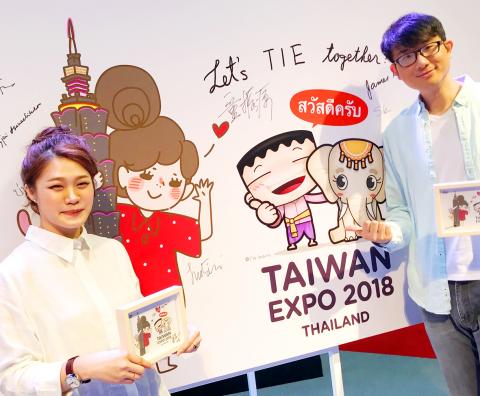
Photo: Lo Chien-yi, Taipei Times
“ECOVE has continuously followed EfW business development progress closely and has kept seeking EfW business opportunities in New Southbound countries,” the company’s sales department said.
It bid for the Singapore No. 6 EfW project and is involved in an EfW project in Kuala Lumpur, in addition to the consultation and technical services it provided for some small waste incinerators in Malaysia, Vietnam and India.
However, “awareness is still not enough [in the] global market. In order to expand international business, we decided to launch the ECOVE brand and renew [the] official Web site, uniform and service cars with the new corporate identity,” ECOVE chairman J.J. Liao (廖俊喆) told a news conference last year.
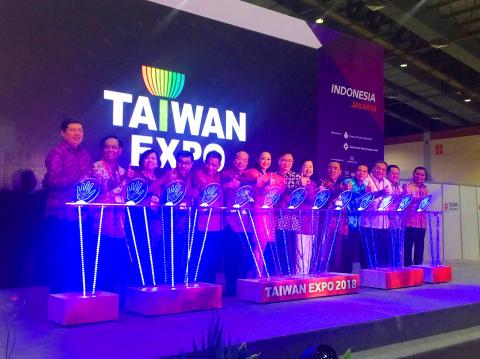
Photo: Lin Ching-hua, Taipei Times
In collaboration with the Branding Taiwan campaign, the company developed a comprehensive rebranding strategy.
“ECOVE has more opportunities for brand strategy conduction and brand promotion, which is beneficial for ECOVE to build international channels and the expansion of brand business overseas,” the sales department said.
Moreover, when a company attends an event overseas, the local Taiwanese mission or trade office always holds a news conference to increase the company’s exposure, it added.
Another barrier to entry into overseas markets, as mentioned by Lien, is the difficulty of entering markets as a small enterprise.
Each of the southbound markets is immense and can be daunting to a firm that is not familiar with local rules and business cultures.
One of the policy’s core functions is to “define Taiwan’s role in regional development,” establishing the nation as “an innovator, a sharer and a provider of services.”
As part of this effort, the government has proposed a budget of NT$1 billion (US$32.49 million) for the ministry’s Taiwan External Trade Development Council (TAITRA) next year to continue its work promoting business-to-business exchanges, organizing trade shows, establishing southbound company networking associations and helping businesses navigate overseas markets.
One of TAITRA’s primary offerings is the Taiwan Expo, which brings the nation’s services and products to southbound nations to showcase Taiwanese excellence and facilitate face-to-face exchanges.
Through its collection of the best of Taiwanese industry in one place and its pavilions showcasing key innovations, the expo helps market the nation as an active partner in the region.
At the Taiwan Expo in Vietnam from July 26 to July 28, 190 exhibitors participated, drawing 26,000 visitors for total potential business of US$98 million, TAITRA said in its post-show report.
Of the visitors, 99 percent said they liked the quality of the products and services exhibited, while 94 percent of exhibitors were satisfied with the business result, it added.
One of the segments showcased was the Taiwan Bubble Tea Pavilion, which included Chen En Food Product Enterprise Co (承恩食品企業), a comprehensive bubble tea business services provider that helps aspirants start a drink shop, from menu planning and material procurement, to business strategizing.
Chen En already does business in Singapore, Malaysia, the Philippines, Indonesia, Vietnam and other countries, but aims to become the exclusive agency that cooperates with bubble tea businesses in the region, marketing director Vincent Liu (柳聖恩) said.
The firm has received subsidies from TAITRA to participate in overseas exhibitions, as well as information about southbound policies and markets, and invitations to speak abroad, he said.
The pavilion, which also featured in the Taiwan Expo in Indonesia from March 29 to March 31, introduced the TAITRA Bubble Tea Marketing Alliance certification to verify products’ authenticity as a Taiwanese product, as well as the slogan “Taiwan Bubble Tea, Bubble Up Your Life” to bolster the drink’s identification as a Taiwanese product, a news release on TAITRA’s Taiwantrade Web site said.
“Taiwan promotes bubble tea as a way of food diplomacy, which also enhances bubble tea’s international image,” it added.
Also present at the Taiwan Expos in India, Vietnam, Thailand and Malaysia this year was ECOVE, which joined the Taiwan Green Product Pavilion.
The expos help to strengthen Taiwan’s image as a nation of talent and opportunity, as well as its unique culture it wishes to share with the world.
As ECOVE is eyeing larger EfW projects in southbound nations, it is hoping to receive more government help to secure these public-private partnership tenders.
The government has allocated NT$500 million for official development assistance loans to targeted nations next year to aid Taiwanese companies wishing to secure larger projects overseas.
While not directly subsidizing businesses, the program has the potential to help make Taiwanese businesses more attractive to foreign governments as they bid for projects.
Last year, Taiwan secured 17 public projects in southbound nations, with a combined bidding price of US$25.2 billion, and in just the first seven months of this year won 20 more projects worth US$25 billion, the Taipei Times reported.
In only two years, the immediate benefits enjoyed by businesses are apparent, but as the policy matures, it is the longer-term benefits that will have the greatest effect.
Taiwan’s repositioning as a talented partner to ASEAN, South Asian countries, Australia and New Zealand would continue to grow collaborations and ensure that Taiwan comes to mind first as a valued partner.

Trips for more than 100,000 international and domestic air travelers could be disrupted as China launches a military exercise around Taiwan today, Taiwan’s Civil Aviation Administration (CAA) said yesterday. The exercise could affect nearly 900 flights scheduled to enter the Taipei Flight Information Region (FIR) during the exercise window, it added. A notice issued by the Chinese Civil Aviation Administration showed there would be seven temporary zones around the Taiwan Strait which would be used for live-fire exercises, lasting from 8am to 6pm today. All aircraft are prohibited from entering during exercise, it says. Taipei FIR has 14 international air routes and

Taiwan lacks effective and cost-efficient armaments to intercept rockets, making the planned “T-Dome” interception system necessary, two experts said on Tuesday. The concerns were raised after China’s military fired two waves of rockets during live-fire drills around Taiwan on Tuesday, part of two-day exercises code-named “Justice Mission 2025.” The first wave involved 17 rockets launched at 9am from Pingtan in China’s Fujian Province, according to Lieutenant General Hsieh Jih-sheng (謝日升) of the Office of the Deputy Chief of the General Staff for Intelligence at the Ministry of National Defense. Those rockets landed 70 nautical miles (129.6km) northeast of Keelung without flying over Taiwan,

City buses in Taipei and New Taipei City, as well as the Taipei MRT, would on Saturday begin accepting QR code payments from five electronic payment providers, the Taipei Department of Transportation said yesterday. The new option would allow passengers to use the “transportation QR code” feature from EasyWallet, iPass Money, iCash Pay, Jkopay or PXPay Plus. Passengers should open their preferred electronic payment app, select the “transportation code” — not the regular payment code — unlock it, and scan the code at ticket readers or gates, General Planning Division Director-General Liu Kuo-chu (劉國著) said. People should move through the

The Ministry of National Defense (MND) today released images of the military tracking China’s People's Liberation Army (PLA) movements during the latest round of Chinese drills around Taiwan. The PLA began "Justice Mission 2025" drills today, carrying out live-fire drills, simulated strikes on land and maritime targets, and exercises to blockade the nation's main ports. The exercises are to continue tomorrow, with the PLA announcing sea and air space restrictions for five zones around Taiwan for 10 hours starting from 8:30am. The ministry today released images showing a Chinese J-16 fighter jet tracked by a F-16V Block 20 jet and the